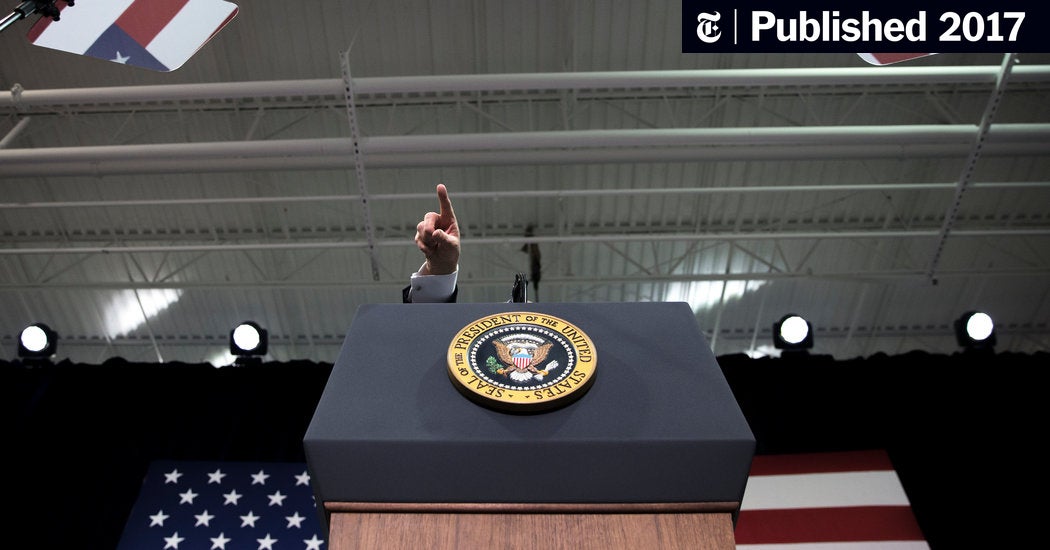Analyzing Trump's Harsh Rhetoric On European Trade Deals

Table of Contents
Key Targets of Trump's Trade Rhetoric
Trump's trade rhetoric didn't target a single entity; instead, it encompassed both the European Union as a whole and specific member states.
The European Union as a Whole
Trump consistently criticized the European Union, characterizing it as imposing unfair trade barriers and engaging in protectionist practices detrimental to American interests. His pronouncements frequently included:
- Criticism of EU trade barriers: He repeatedly attacked EU tariffs and regulations, viewing them as obstacles to American exports.
- Accusations of unfair trade practices: Trump accused the EU of employing subsidies and other practices that gave European companies an unfair advantage in the global market.
- Threats of tariffs on various European goods: He frequently threatened to impose tariffs on European products, notably automobiles and steel, to leverage trade concessions.
For instance, Trump's frequent mentions of a large US trade deficit with the EU, often coupled with threats of retaliatory tariffs on German automobiles, created significant uncertainty for businesses on both sides of the Atlantic. The potential impact on the European automotive industry, a significant contributor to the EU's GDP, was a major point of concern.
Specific European Countries
While targeting the EU as a whole, Trump also singled out specific countries for criticism, often Germany and France. This targeted approach aimed to maximize pressure and exploit perceived weaknesses.
- Germany: Frequently criticized for its large trade surplus with the US, Germany was a primary target of Trump's trade rhetoric. Specific industries, such as the automotive sector, faced the brunt of his criticism.
- France: France's agricultural policies and digital services tax also drew Trump's ire, further illustrating the targeted nature of his approach beyond general accusations of unfair trade practices.
The reasoning behind this targeted approach was to leverage bilateral leverage, aiming to secure better trade deals by exploiting perceived vulnerabilities within the EU's internal dynamics. This strategy often intensified tensions between member states and the EU itself.
Justifications for Trump's Aggressive Approach
Trump's aggressive trade policies were primarily justified by two key tenets: the "America First" doctrine and allegations of unfair European trade practices.
The "America First" Doctrine
This core principle underpinned Trump's approach to international relations, including trade negotiations. The implications for European trade deals were substantial.
- Prioritizing American interests: The "America First" doctrine prioritized American jobs and industries, often at the expense of traditional international cooperation.
- Re-negotiating unfavorable trade deals: Trump argued many existing trade deals were unfair to the US, requiring renegotiation or withdrawal. This rhetoric fueled his attacks on existing US-EU trade agreements.
Statements like "We're not going to be taken advantage of anymore" consistently underscored this narrative, justifying aggressive tactics in trade negotiations.
Allegations of Unfair Trade Practices
Trump's administration repeatedly accused the EU of engaging in unfair trade practices, providing a justification for its aggressive stance.
- EU tariffs and subsidies: These were cited as examples of protectionist measures designed to harm American businesses.
- Lack of reciprocity: Trump argued the EU did not offer reciprocal trade access to American goods and services.
While some of these allegations had merit, the evidence presented by the Trump administration was often contested by the EU, leading to a cycle of accusations and counter-accusations that further strained relations.
Consequences of Trump's Rhetoric and Actions
The consequences of Trump's harsh rhetoric and trade policies were far-reaching, impacting transatlantic relations and the broader global trade landscape.
Impact on Transatlantic Relations
Trump's approach significantly damaged the historically strong relationship between the US and the EU.
- Strained relationships: Increased mistrust and antagonism characterized the relationship, making future cooperation more challenging.
- Decreased cooperation on international issues: The trade disputes overshadowed cooperation on other crucial matters, such as security and climate change.
- Uncertainty in trade partnerships: The unpredictable nature of Trump's policies created uncertainty for businesses and investors on both sides of the Atlantic.
This erosion of trust extended beyond economic issues, affecting political and security cooperation across a range of vital interests.
Global Trade Implications
Trump's actions had broader consequences for global trade, contributing to a rise in protectionist sentiment.
- Increased protectionist sentiment globally: Trump's actions emboldened protectionist movements in other countries, leading to a rise in trade barriers globally.
- Trade wars: Trump's aggressive tactics sparked retaliatory measures from the EU and other trading partners, leading to trade wars and economic disruptions.
- Disruptions to supply chains: The uncertainty and disputes created disruptions in global supply chains, affecting businesses and consumers worldwide.
Conclusion
This analysis demonstrates that Trump's harsh rhetoric significantly impacted US-EU trade relations. His "America First" approach, coupled with accusations of unfair trade practices, led to increased tensions and uncertainty. The consequences included damaged transatlantic ties and broader implications for global trade patterns. Understanding Trump's approach to European trade deals is crucial for navigating future trade negotiations and understanding the complexities of international economic relations. Further research into the lasting effects of this rhetoric, and analysis of alternative approaches to trade disputes, is needed to inform future policy discussions on US-EU trade and to avoid similar escalations in the future. Further analysis of Trump's trade rhetoric can illuminate better approaches to international trade negotiations.

Featured Posts
-
 Cayuga County Flash Flood Warning Issued Due To Severe Thunderstorms
May 26, 2025
Cayuga County Flash Flood Warning Issued Due To Severe Thunderstorms
May 26, 2025 -
 Hells Angels Motorcycle Club History Membership And Activities
May 26, 2025
Hells Angels Motorcycle Club History Membership And Activities
May 26, 2025 -
 El Real Madrid De Florentino Perez Una Epoca Dorada
May 26, 2025
El Real Madrid De Florentino Perez Una Epoca Dorada
May 26, 2025 -
 Kiefer Sutherland Remembers Donald Sutherland At Canadian Screen Awards Ceremony
May 26, 2025
Kiefer Sutherland Remembers Donald Sutherland At Canadian Screen Awards Ceremony
May 26, 2025 -
 Rtbf Et Rtl Belgium Contre Le Piratage Iptv Quelles Consequences Pour Les Utilisateurs
May 26, 2025
Rtbf Et Rtl Belgium Contre Le Piratage Iptv Quelles Consequences Pour Les Utilisateurs
May 26, 2025
Latest Posts
-
 Jon Jones Training Injury The Hasbulla Factor
May 30, 2025
Jon Jones Training Injury The Hasbulla Factor
May 30, 2025 -
 Hasbulla Fight Training Jon Jones Suffers Injury
May 30, 2025
Hasbulla Fight Training Jon Jones Suffers Injury
May 30, 2025 -
 Jon Jones Injury Daily Training Sparring With Hasbulla Takes Toll
May 30, 2025
Jon Jones Injury Daily Training Sparring With Hasbulla Takes Toll
May 30, 2025 -
 Six Months Jon Joness Demand For Aspinall Rematch Preparation
May 30, 2025
Six Months Jon Joness Demand For Aspinall Rematch Preparation
May 30, 2025 -
 Did The Daniel Cormier Rivalry Break Jon Jones A Ufc Analysts View
May 30, 2025
Did The Daniel Cormier Rivalry Break Jon Jones A Ufc Analysts View
May 30, 2025
